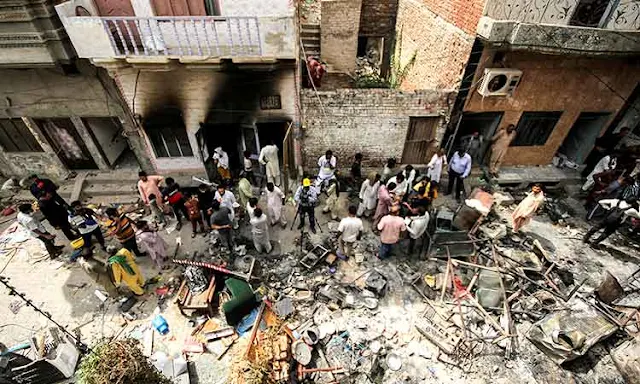 |
| Members of the Christian community protest the attacks on churches and houses in Jaranwala |
Pakistan's Defence Minister, Khawaja Asif, described the attacks on religious minorities as a "matter of concern and embarrassment" while speaking in the National Assembly.
On Monday, Pakistan's Defence Minister Khawaja Asif acknowledged that the government has not done enough to safeguard the nation's minorities from "targeted violence in the name of religion."
"Minorities are being murdered daily... no religious minority is safe in Pakistan. Even the smaller sects of the Muslims are not safe," Dawn news quoted Khawaja saying during a session of Pakistan's National Assembly.
The coalition government led by Prime Minister Shehbaz Sharif tabled a resolution condemning the recent incidents of mob lynching related to blasphemy allegations.
Calling the attacks a "matter of concern and embarrassment", Asif called for a resolution to safeguard minorities. He highlighted that many victims had no connection to blasphemy allegations but were targetted due to personal vendettas.
"We must ensure the safety of our minority brothers and sisters. They have as much right to live in this country as the majority. Pakistan belongs to all Pakistanis, regardless of whether they are Muslim, Christian, Sikh, or of any other faith. Our Constitution guarantees full protection to minorities," Dawn quoted Asif as saying.
However, the government could not table the resolution due to strong protests by Pakistan Tehreek-e-Insaf (PTI), the party of former Prime Minister Imran Khan.
Pakistan has some of the worst blasphemy laws in the world, which has a significant impact on the nation's religious minority. These rules, which are included in the Pakistan Penal Code, stipulate harsh penalties—such as the death penalty—for a variety of blasphemous offences, such as insults directed at Islam, the Prophet Muhammad, or the Quran.
Under these regulations, religious minorities like as Christians, Hindus, and Sikhs are disproportionately tried and found guilty. Since the Pakistani Constitution does not recognise the Ahmadis as Muslims, even this minority group of Muslims faces persecution.
On May 25, a Christian man was beaten and his house was set afire by a charged mob in Sargodha city over suspicion of blasphemy.
The persecution is not only limited to blasphemy allegations. Hindus and Sikh minorities, especially in the Sindh region, face social discrimination and girls are often abducted, forcibly converted to Islam, and married off to Muslim men.













0 Comments:
Post a Comment